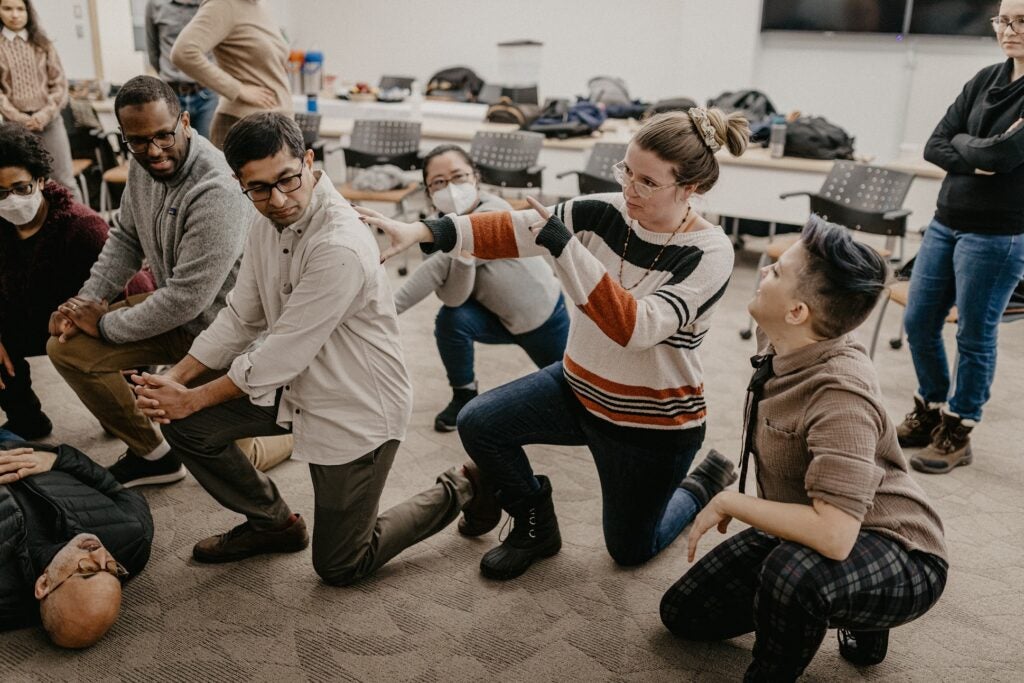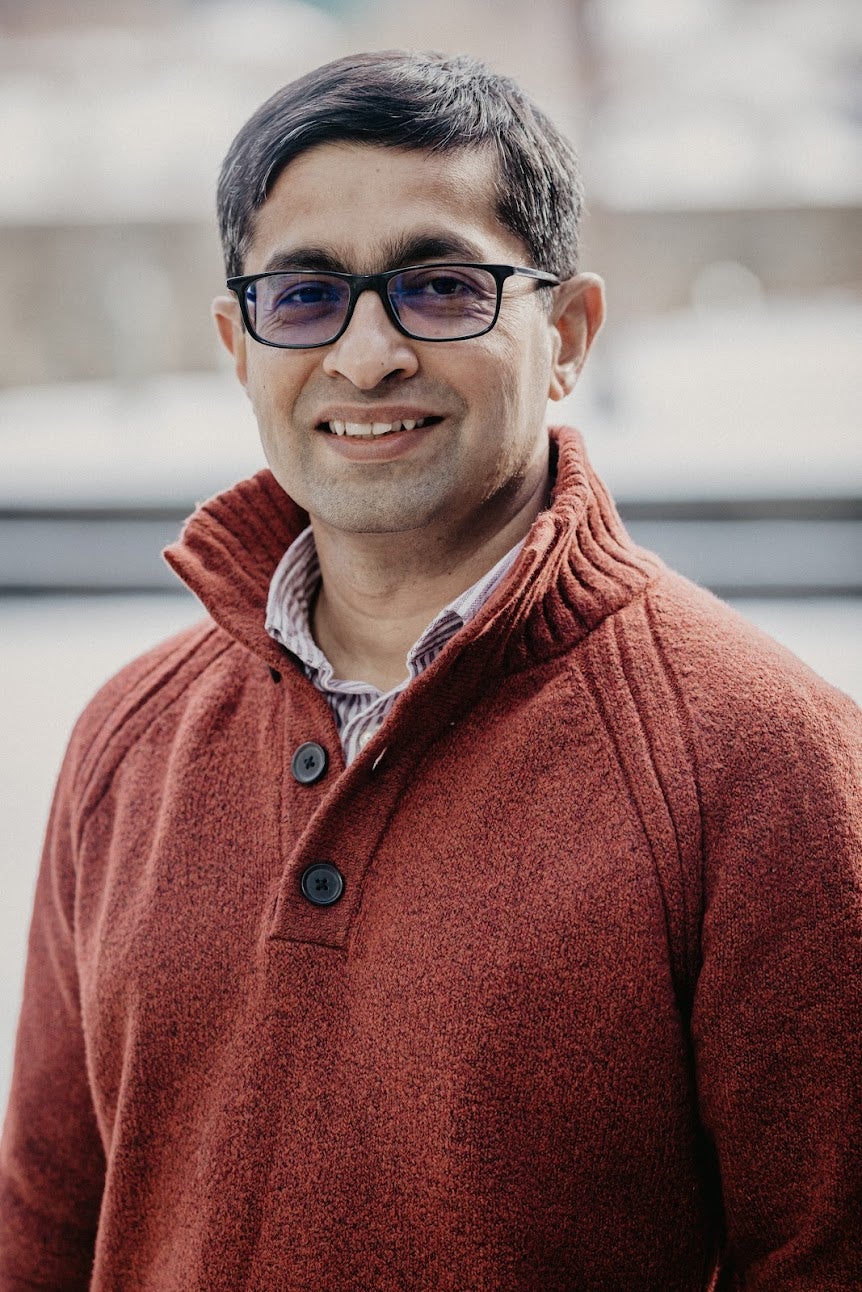URI Geosciences assistant professor Dr. Ambarish Karmalkar knows that to create change, one has to go beyond the science. While he is most well-versed in the physical sciences aspects of climate change–he holds degrees in physics, astronomy, and geosciences–he is using his time as a 2024 SciComm Identities Project Fellow to develop his science communication skills and his work as a climate science translator. Here, we ask him more about his work, the Fellowship, and the challenges of translating science for stakeholders.
What’s the day-to-day look like for you in your research?
It’s a lot of data analysis. I rely on big observational and climate model datasets to study how climate is changing in different parts of the world, from the Arctic to Antarctica. I spend a fair bit of time analyzing observations because they tell us how the climate system has already changed in response to greenhouse gas emissions. I use that information to evaluate climate models and then to understand how different aspects of the climate system will change in the future. Many observational and climate model datasets I use are publicly available, which makes climate science a data-rich field.
Most of my time is spent analyzing data using Python. Working with very big data sets involves lots of data processing, using statistical analysis and machine learning techniques to extract useful information, and then creating visuals. Visualizing data is really important in my research. I am constantly thinking about effective ways to visualize data to fully understand the movement of winds for example, how they carry moisture that leads to rainfall in different parts, and how temperatures vary spatially in a certain region.
On your website, it says that you are a “climate science translator.” What does it mean to be a climate science translator?
I started out as a physical scientist just trying to understand how the climate system works, how it is represented in computer models, and what these models tell us about how climate will change in the future. Over the last few years though, there has been a growing interest in using climate data and regional projections to design adaptation and conservation strategies. But there are challenges in communicating all that information to the end users. There are a whole host of uncertainties that need to be considered while creating climate projections. The end product is not just one number describing how the climate is going to change in the future but it’s typically a range of numbers that encapsulates all future uncertainties. My responsibility as a climate scientist is to not just provide numbers but also provide proper guidance on best practices to use that data. That’s where this idea of climate science translation becomes important.
Over the years I’ve also realized that climate is often just one small part of all the factors that contribute to adaptation or conservation decisions. I might have a lot of data that I would want the decision-makers to use, but they might need a very specific piece of information from all the climate projections I have created. The conversation then is about understanding the decision they’re trying to make and identifying the most relevant piece of information I can give them. There is this constant back and forth, between the climate scientists and the end users, which is absolutely critical for making the data user-friendly. What I’ve come to appreciate over the years is that I need to have continued conversations with the end users, understand their needs, and refine my climate product to create what we call actionable climate information.
What inspired you to apply for the SCIP Fellowship and what was your knowledge and experience with science communication prior to that?
I was part of the Northeast Climate Adaptation Science Center at UMass Amherst before joining URI, and one of my responsibilities was to collaborate with ecologists and hydrologists to do interdisciplinary science and to work with regional managers and stakeholders focusing on adaptation and conservation issues. I slowly started getting involved in climate science translation work in addition to fundamental climate science research. But I’ve never received training in climate or science communication. So when I came across the SCIP fellowship, it was a no-brainer. I’ve always been interested in science communication, and given my field of research, I am sure I will continue to work with folks from a variety of disciplines all focusing on climate issues. What caught my attention was also the theme of this year’s fellowship – climate change and water – which is what my research is all about.
One very specific motivation is that I want to understand how to connect with different types of audiences because I interact with the general public, I work with state officials, and I collaborate with scientists from different disciplines. They’re all interested in the climate information I produce but I often find it difficult to figure out how to craft my message for different audiences. I want to learn more about science communication strategies I could use depending on the people I am interacting with.

What has been the highlight of the fellowship so far and what are you still most looking forward to?
The first workshop in January was excellent. It was very well organized and the activities were well thought-out. One highlight for me was the training related to crafting a story. What has stuck with me is the importance of identifying elements that are key to the story you are trying to tell. When I talk about research with the general public, I have the urge to tell my audience every interesting little thing that I have done and I have discovered. What I learned in the workshop is that you have to think carefully about your audience, what your main message is, and what some of the foundational elements are that will help you tell a compelling story. That’s what I am hoping to do when we create a podcast as the next phase of the fellowship.
What have been some of the shortcomings in science communication that you’ve noticed in your field? How are you hoping to address them within your work?
What I’ve struggled with is accounting for my audience’s interests. When I am engaging with a wider audience, I sometimes struggle to identify topics that will resonate with them or anticipate what they’re looking for. In certain cases, understanding what your audience is looking for can take time. To produce information for natural resource conservation issues, for example, building relationships with the manager or the agency and continued dialogue over a long period is critical. That helps with understanding their key concerns and the decisions they are trying to make and gives one time to think about the appropriate type of information one can provide. There are often barriers that come in the way of cultivating those relationships. Now that I’ve joined URI, I’m hoping I can build relationships in the region as I start new projects, and implement the skills and tools that I learn through this fellowship to strengthen my communication strategies going forward.
Interview conducted and condensed by Sarah Heavren, Graduate Communications Fellows at URI College of the Environment and Life Sciences.

